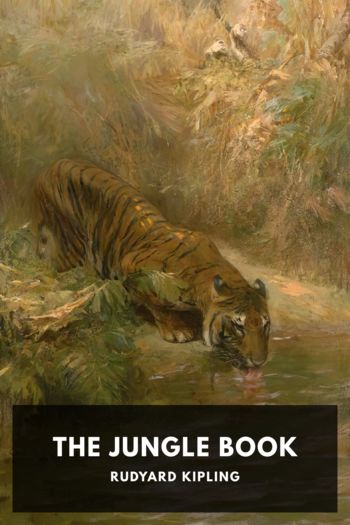Kim - Rudyard Kipling (top 50 books to read .TXT) 📗

- Author: Rudyard Kipling
Book online «Kim - Rudyard Kipling (top 50 books to read .TXT) 📗». Author Rudyard Kipling
As usual, the lama had led Kim by cow-track and byroad, far from the main route along which Hurree Babu, that “fearful man,” had bucketed three days before through a storm to which nine Englishmen out of ten would have given full right of way. Hurree was no game-shot—the snick of a trigger made him change colour—but, as he himself would have said, he was “fairly effeecient stalker,” and he had raked the huge valley with a pair of cheap binoculars to some purpose. Moreover, the white of worn canvas tents against green carries far. Hurree Babu had seen all he wanted to see when he sat on the threshing-floor of Ziglaur, twenty miles away as the eagle flies, and forty by road—that is to say, two small dots which one day were just below the snow-line, and the next had moved downward perhaps six inches on the hillside. Once cleaned out and set to the work, his fat bare legs could cover a surprising amount of ground, and this was the reason why, while Kim and the lama lay in a leaky hut at Ziglaur till the storm should be over-past, an oily, wet, but always smiling Bengali, talking the best of English with the vilest of phrases, was ingratiating himself with two sodden and rather rheumatic foreigners. He had arrived, revolving many wild schemes, on the heels of a thunderstorm which had split a pine over against their camp, and so convinced a dozen or two forcibly impressed baggage-coolies the day was inauspicious for farther travel that with one accord they had thrown down their loads and jibbed. They were subjects of a Hill-Rajah who farmed out their services, as is the custom, for his private gain; and, to add to their personal distresses, the strange Sahibs had already threatened them with rifles. The most of them knew rifles and Sahibs of old: they were trackers and shikarris of the Northern valleys, keen after bear and wild goat; but they had never been thus treated in their lives. So the forest took them to her bosom, and, for all oaths and clamour, refused to restore. There was no need to feign madness or—the Babu had thought of another means of securing a welcome. He wrung out his wet clothes, slipped on his patent-leather shoes, opened the blue-and-white umbrella, and with mincing gait and a heart beating against his tonsils appeared as “agent for His Royal Highness, the Rajah of Rampur, gentlemen. What can I do for you, please?”
The gentlemen were delighted. One was visibly French, the other Russian, but they spoke English not much inferior to the Babu’s. They begged his kind offices. Their native servants had gone sick at Leh. They had hurried on because they were anxious to bring the spoils of the chase to Simla ere the skins grew moth-eaten. They bore a general letter of introduction (the Babu salaamed to it orientally) to all Government officials. No, they had not met any other shooting-parties en route. They did for themselves. They had plenty of supplies. They only wished to push on as soon as might be. At this he waylaid a cowering hillman among the trees, and after three minutes’ talk and a little silver (one cannot be economical upon State service, though Hurree’s heart bled at the waste) the eleven coolies and the three hangers-on reappeared. At least the Babu would be a witness to their oppression.
“My royal master, he will be much annoyed, but these people are onlee common people and grossly ignorant. If your honours will kindly overlook unfortunate affair, I shall be much pleased. In a little while rain will stop and we can then proceed. You have been shooting, eh? That is fine performance!”
He skipped nimbly from one kilta to the next, making pretence to adjust each conical basket. The Englishman is not, as a rule, familiar with the Asiatic, but he would not strike across the wrist a kindly Babu who had accidentally upset a kilta with a red oilskin top. On the other hand, he would not press drink upon a Babu were he never so friendly, nor would he invite him to meat. The strangers did all these things, and asked many questions—about women mostly—to which Hurree returned gay and unstudied answers. They gave him a glass of whitish fluid like to gin, and then more; and in a little time his gravity departed from him. He became thickly treasonous, and spoke in terms of sweeping indecency of a Government which had forced upon him a white man’s education and neglected to supply him with a white man’s salary. He babbled tales of oppression and wrong till the tears ran down his cheeks for the miseries of his land. Then he staggered off, singing love-songs of Lower Bengal, and collapsed upon a wet tree-trunk. Never was so unfortunate a product of English rule in India more unhappily thrust upon aliens.
“They are all just of that pattern,” said one sportsman to the other in French. “When we get into India proper thou wilt see. I should like to visit his Rajah. One might speak the good word there. It is possible that he has heard of us and wishes to signify his goodwill.”
“We have not time. We





Comments (0)